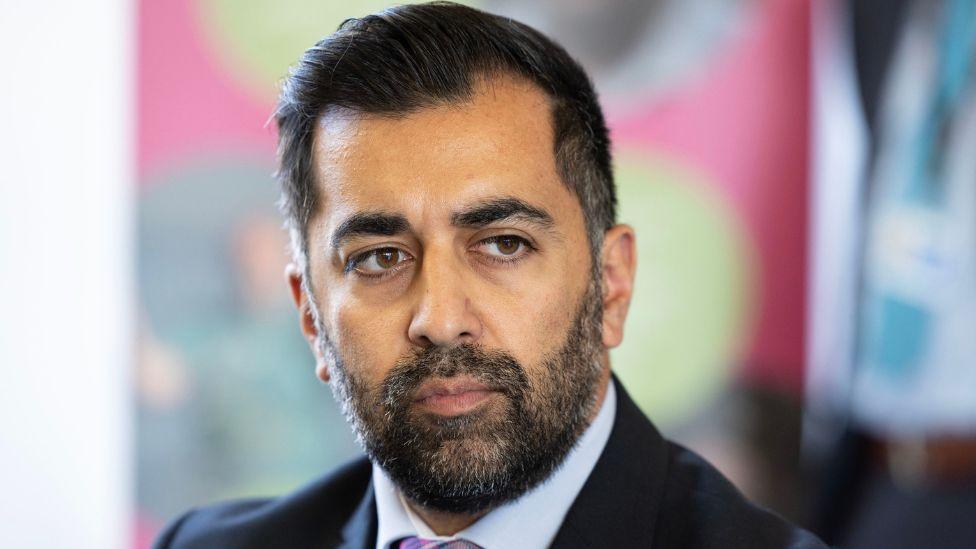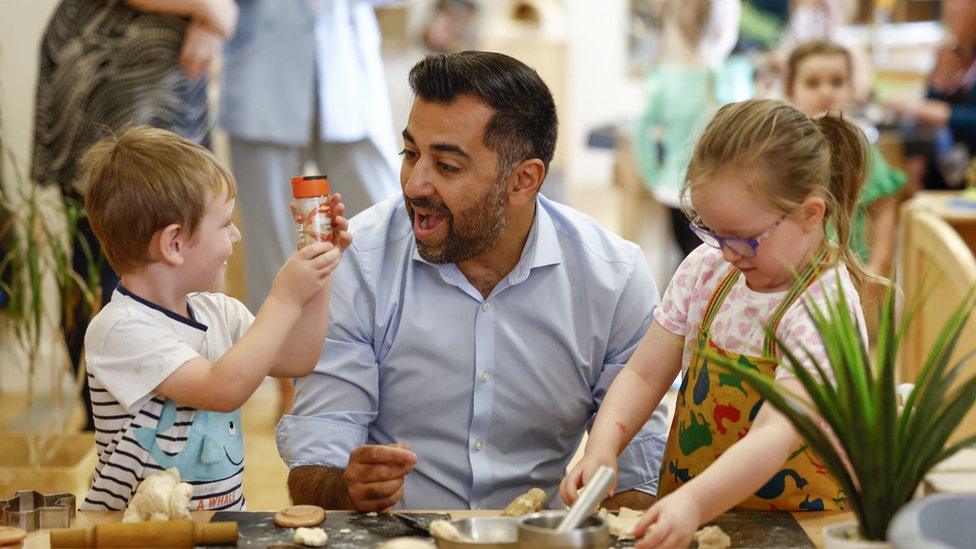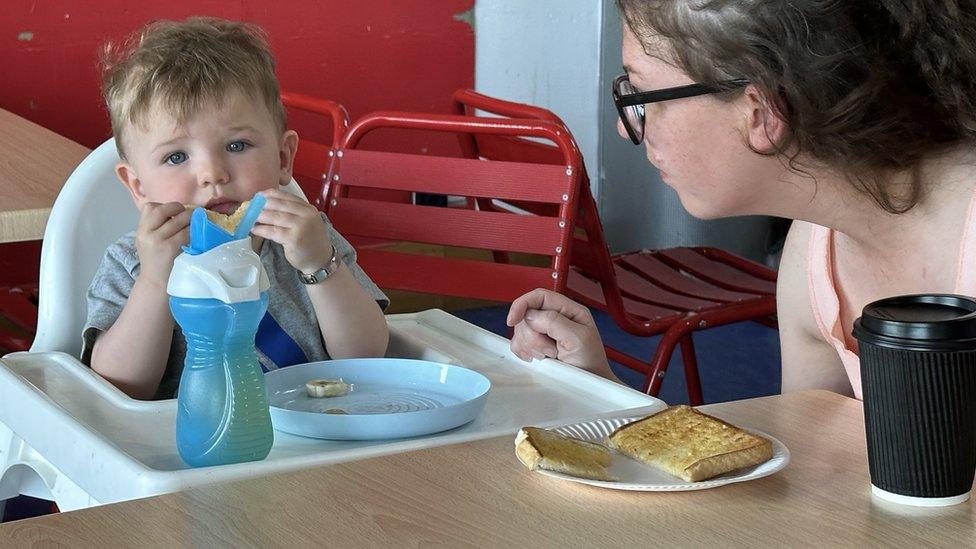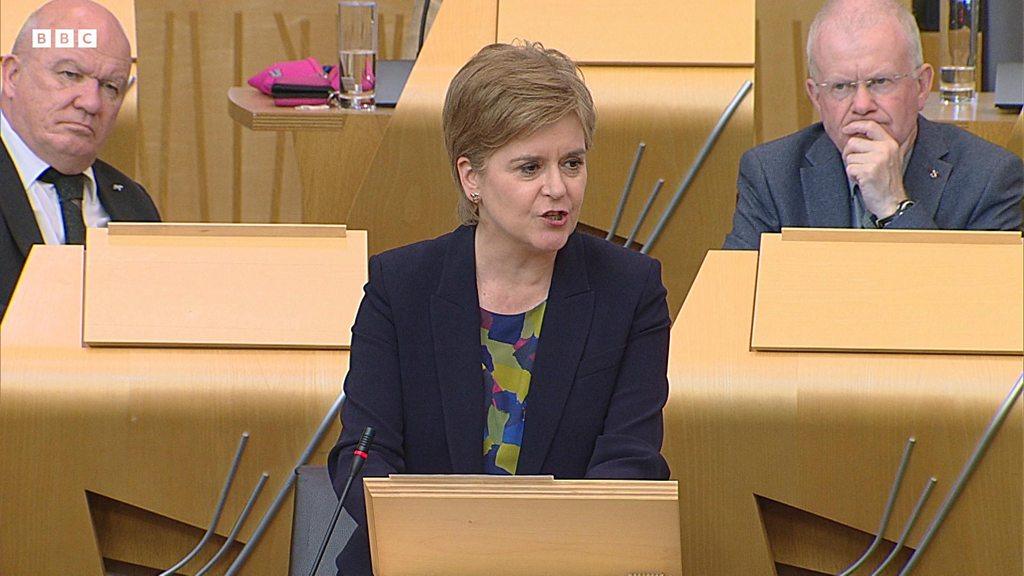Nicola Sturgeon makes first Holyrood speech since arrest
- Published
As Nicola Sturgeon was being urged to wind up her seven-and-a-half minute address, Deputy Presiding Officer Annabelle Ewing mistakenly called her "first minister"
Nicola Sturgeon has backed her successor's plan to tackle child poverty as she made her first Holyrood speech since being arrested.
The ex-SNP leader was also mistakenly referred to as "first minister" by deputy presiding officer Annabelle Ewing, sparking laughter from MSPs.
She welcomed the plans for expanded childcare provisions announced by Humza Yousaf the previous day
Ms Sturgeon was arrested in June amid an investigation into SNP finances.
She was released without charge and has denied any wrongdoing.
Ms Sturgeon said she "enthusiastically" supported the programme for government announced by Mr Yousaf.
She welcomed plans to pilot extended childcare for one and two year olds.
"The pilot that was announced [by Mr Yousaf] was a sensible approach and I hope very much that it will lead as soon as possible to mainstreamed provision," Ms Sturgeon told MSPs.
The former SNP leader, who stepped down in February, also backed measures to help Scotland meet its emissions targets and build renewables capacity.
It was Ms Sturgeon's first programme for government debate in 17 years where she has not been first minister or deputy first minister.
She said she accepted her "share of responsibility for the state of our political discourse", but called for "mature debate" on how policies are paid for and the powers the Scottish Parliament has.
Ms Sturgeon also urged those who oppose independence not to "close their minds" to additional powers for Holyrood.

Humza Yousaf announced his programme for government on Monday
As part of proposals in is programme for government to tackle the "scourge" of poverty, Mr Yousaf pledged investment of more than £400m in the Scottish Child Payment to provide more than £1,000 a year for over 300,000 children.
The first minister also vowed that private and voluntary sector staff working in children's services, adult social care and those who deliver funded early learning and childcare would receive at least £12 an hour from April 2024.
Mr Yousaf blamed budgetary pressures caused by the "disastrous" 2022 mini-budget and "sky-high" inflation, for not being able to deliver immediate pay increases.
Questioned on how the government would raise the hundreds of millions of pounds required for the plans, the first minister told BBC Scotland that "really difficult decisions" would need to be made at the next Scottish Budget to fund pay rises.
"We'd have to look at budgets right across government to see where we might have to be more targeted in terms of our spending," he said.
The SNP leader said ministers would consider "progressive" taxation. However, he warned any changes would depend on Westminster tax policy.
"We will need to look at what the UK government is going to do in terms of taxation too because if that divergence becomes too wide then there could be behavioural impacts that have to be considered," Mr Yousaf said.
Higher earners in Scotland already pay more in income tax than those in the rest of the UK, with people earning more than £43,663 paying income tax at the higher rate of 42%, while in the rest of the UK a higher rate of 40% is only levied on earnings over £50,271.
John Dickie, director of the Child Poverty Action Group in Scotland, described the programme for government as "disappointing".
"We're not seeing the scale of action needed to meet Scotland's child poverty targets," he told BBC Radio's Good Morning Scotland programme.
Annual figures released in March showed almost a quarter (24%) of children in Scotland were living in relative poverty between 2019 and 2022. The Scottish government is aiming to cut that figure to 18% by March 2024, and to 10% by 2030.
Mr Dickie said the £25 a week Scottish Child Payment was making a difference but would need to be increased to meet the targets, a move Mr Yousaf indicated he would be in favour of during his SNP leadership campaign.
Mr Dickie called for further investment in childcare, help for parents to seek employment and action to mitigate the UK government's two-child cap on some benefits.
"What we heard [from the first minister] needs to be the first step in a transformation of our childcare system so that all parents, especially mums, can work the hours they want confident that their children are in settings where they are thriving," he told Good Morning Scotland.
He added: "There really is no credible route to meeting the government's child poverty targets that does not involve further investment in social security alongside action to transform childcare."
'Critical missed opportunity'
Poverty Alliance Acting Director David Reilly described the programme for government as a "critical missed opportunity".
He welcomed plans to extend childcare provision but called for universal funded entitlement of 50 hours per week for children aged 6 months and above.
The poverty campaigner said childcare workers "deserve more" than the increase to £12 an hour.
He said he the organisation was "bitterly disappointed" with the measures and said the government would need to increase the Scottish Child Payment to £40 a week to meet its 2030 target.
Mr Reilly added: "Although welcome, an inflation increase wont keep pace with the cost of essentials, meaning it will cover less food, less clothes, and less energy."
- Published6 September 2023

- Published13 June 2023

- Published6 September 2023
